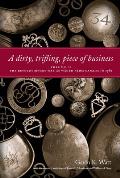

|
 |
|
This article on Loyalist families is presented in 8 parts. Click below to skip to:
Part 1 - Introduction |
Female Ancestors |
|
Those Left Behind For those left behind in the country, life was difficult both for the family itself and for the soldier who left them. A typical incident, intended to harass and intimidate, occurred on July 1, 1777 to the family of Captain Thomas CROWELL, a New Jersey Loyalist: A Party of Rebel Light Horse went to the House of Capt. Thomas CROWELL, of Shrewsbury, in New-Jersey, last Tuesday, and robbed him of all his Cattle, Sheep, Hogs and Horses; and told Mrs. CROWELL, as soon as they had disposed of what they then took, they intended to return and carry off all her Household Furniture, and then dispose of her House and Plantation at public sale.4 Some men risked punishment at the hands of their own army to fetch their loved ones from the country. Jacob WOOD, a private in the 2nd Battalion, New Jersey Volunteers, received distressing news of his family in New Jersey while he lay stationed on the lines at Kingsbridge. Early in 1778 he requested permission to go into the country and bring his family in, but was denied permission. Taking matters into his own hands, he sneaked into New Jersey and brought his family off safe to the garrison of N.J.V. at Sandy Hook, where he was later put under arrest for desertion.5 Others attempted the same measure with various degrees of subtly. Benjamin GALLOWAY of Delaware received a pass and flag of truce from Brigadier General BIRCH, commandant of New York, and Admiral Sir George Bridges RODNEY of the Royal Navy on October 3, 1780, to peacefully bring in his family as well as the families of William PERRY and Joseph SMITH. Upon arriving in Delaware they acquainted the local militia commanders of their purpose, and copies of their pass and intentions were forwarded to the governor, with assurances that their families would be procured and allowed to leave with them. After waiting four days their vessel was boarded by Major William Poke with a party of armed men, and the Loyalists were chained and committed to prison. While in prison they were informed that having joined the British, they would stand trial for high treason. After a confinement of 21 days, they broke the prison and were back in New York, without the families, by December.6 Others had less faith in flags of truce and called on their neighbors for help. One of these people was Robert FITZRANDOLPH, a distiller from Middlesex County, New Jersey. Having been suspected of giving information to the British, FITZRANDOLPH was forced to flee his home in Woodbridge and make into the British Lines at Amboy, soon after settling on Staten Island. That after he had been about a month on Staten Island he heard that his Wife and Three Children whom he had left were in danger of their Lives from the Violence of the Rebels he therefore got a Party from Staten Island and went in the night time and brought them off. That his house-hold furniture Utensils and every other thing was either Sold or Plundered by the Rebels- his landed property Rented for some time and afterwards Sold at Publick Vendue.7 Often times families needed the armies to return to them in order to seek shelter. A major concern of Loyalists throughout the war was that the British would establish themselves in an area, invite the people to join them, and then evacuate, leaving their families behind. When troops returned to these areas per chance, the families came away. Such was the case in 1778 when British troops under Lord CORNWALLIS entered Bergen County, New Jersey in force, enabling many wives and children of the New Jersey Volunteers to join their husbands and fathers. Others had to risk life and limb to reach troops who would not stay long. Nicholas PRATT was a Connecticut Loyalist from New Haven. He joined the army in 1777, becoming master of a vessel in the Commissary General’s Department. His wife and three children finally reached the British expedition under General TRYON to Connecticut in 1779, “after being several times fired at by the Rebels, and came off.”8 The truth was, though, the vast majority of the women and children left behind by the Loyalist men, soldiers and civilians alike, would sooner or later be forced to leave their property by cash-starved state governments bent on confiscating their property and converting it to hard currency to finance the war. In all territories where there was a Rebel government in power, property and land was confiscated regardless of whether a family occupied a house or not. Usually the owner’s name was published in a newspaper and they had until a certain time to present themselves and state their case. In almost all cases, the owners could not appear, for to do so would bring on arrest and trial for high treason. Richard READING of Middletown, New Jersey had been forced to flee his home in 1776 and had the misfortune to be taken prisoner twice afterwards, spending fifteen months in jail. Upon his release in the Fall of 1779 he found to his dismay his wife and five children sent into the lines by the Rebel authorities in Monmouth County. His finances in ruins, his property confiscated and without employment, he was forced to do what would become common for hundreds of Loyalist families: grudgingly request provisions from the British. A tough circumstance indeed for a people used to self-sufficiency and personal responsibility.9
4 The New York Gazette and the Weekly Mercury, July 7, 1777.
Click here for ---> Female Ancestors Main Page Refugees & Others: Loyalist Families
The On-Line Institute for Advanced Loyalist Studies Copyright Restrictions Document Formatting Optimal Viewing |
 by Angela Elwell HuntHardcover
by Angela Elwell HuntHardcover